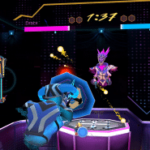The HP Reverb G2 Omnicept Edition, an enhanced version of the company’s new VR headset designed for professional use, is launching next month, starting at $1,249.
HP itself confirmed the news today, adding that orders will be taken from its official website. The G2 Omnicept Edition takes the existing headset and adds sensors to track pupil size and eye movement, the user’s heart rate and even facial expressions with a unit mounted to the bottom of the device. The sensory data, HP says, can be used to enhance the effectiveness of VR training solutions, measuring how users respond to certain situations.
Last year the company also said that eye-tracking could also be used to enable foveated rendering, a technique that only fully renders the area of a VR display the user is looking at. This, in turn, reduces the demand on the compute powering the experience, potentially allowing less powerful devices to run high-fidelity experiences.
HP is announcing an additional update to the Omnicept Edition today, too. The company is adding support for spatial audio to its Omnicept SDK (software development kit). This uses head-related-transfer-functions (HRTFs), a technique for delivering sound at pinpoint locations, to provide more immersive VR audio. The SDK will also arrive in May and supports both Unity and Unreal.
At $1,249 (over $600 more than the $599 base G2), the Omnicept Edition obviously isn’t aimed at consumers, but many of its additions are directly aimed at delivering more data than they are necessarily enhancing immersion. Access to the SDK’s core features will be free, but HP is also introducing different tiers for expanded use. Student and educator access is also free, though HP asks for a 2% revenue share from any profit made from its use. The same revenue share is asked of any developers that employ the kit in their products. Finally, a full $1,499 Enterprise tier includes a perpetual license and a service pack, with additional costs for run time licenses.
We reviewed the base G2 last year. The headset itself is fantastic, though we had really trouble with its cumbersome controllers and spotty tracking.





